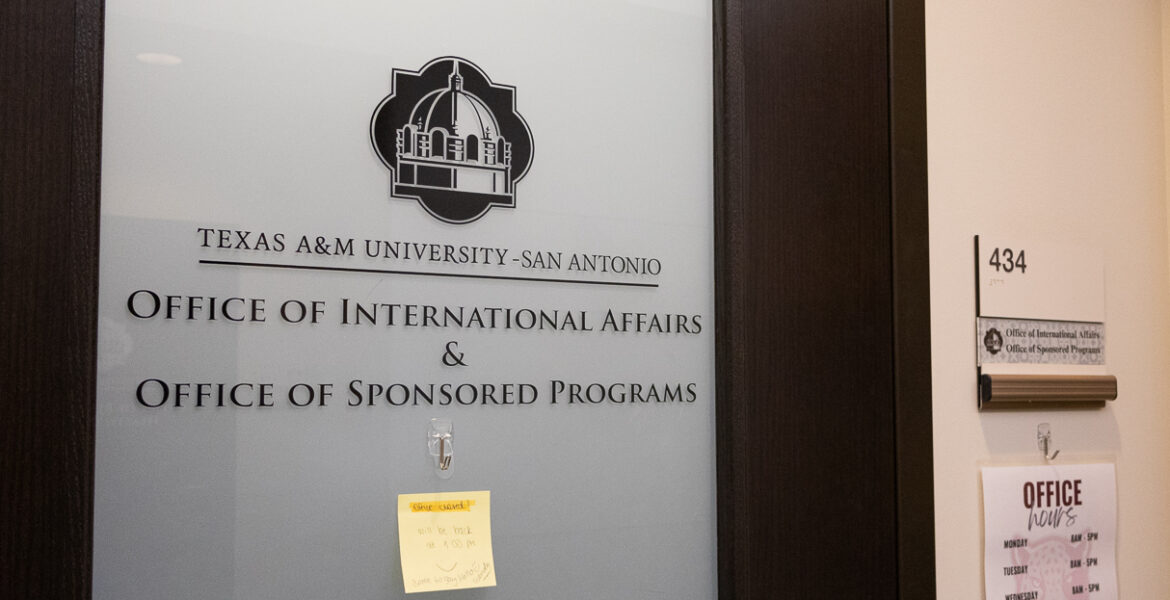As the political world around immigration policies tightens nationwide, international students at Texas A&M University-San Antonio are quietly watching, waiting and in some cases, worrying.
A recent AP News report revealed that more than 1,000 international students have had their visas revoked, sparking widespread concern across U.S. campuses.
Even though the Trump administration recently reversed its decision and restored the visas of thousands of international students, uncertainty remains. Many students are still grappling with fear and confusion over their status. The sudden policy shift has done little to ease the anxieties already stirred across campuses nationwide.
The Office of International Affairs at Texas A&M University-San Antonio is taking steps to protect the peace of mind of international students and reassure them in response to recent events.
“Right now, my students are focused on not being noticed,” said Patricia Zibluk, director of International Affairs at A&M-San Antonio, in an interview April 11. “They just want to stay safe.”
Zibluk says no students at A&M-San Antonio have had their visas revoked as of April 28, but the threat feels close to home. Colleagues at College Station and UT-Austin have already seen students affected.
Marco Rubio, secretary of state, said the government is cracking down on students and other visa holders who have criminal charges or who publicly oppose U.S. foreign policy, such as participating in pro-Palestinian protests. Many of the international students have challenged those accusations.
Although protests on A&M-San Antonio’s campus have remained peaceful and small, that hasn’t stopped students from worrying that even just being involved could bring unwanted attention.
The Office of International Affairs has responded by creating a welcoming and approachable environment where students feel safe checking in.
“Sometimes students just stop by, they come in for chocolates or snacks” Zibluk said. “It creates a relationship, we are able to say to them are you okay? How are things going?”
Her team also uses a group chat to stay in touch with international students, sharing safety updates, news articles, and reminders about what border patrol and immigration officials can and cannot do.
“The best thing we can do is give them information, information, information,” Zibluk said, emphasizing the seriousness of this situation.
In one case, masked agents in plain clothes grabbed a Tufts University doctoral student off the street as she was walking near her apartment March 25 in Somerville, Massachusetts. Rumeysa Ozturk, from Turkey, who had co-written an op-ed supporting Palestine for the school paper, was detained and is now in an ICE facility in Louisiana.
Some students, Zibluk explained, are impacted even without having their visas revoked. One student from a red-listed country is unable to leave the U.S. or have family visit her, potentially for years.
“If she’s accepted into a Ph.D. program, that means writing off seeing her family for at least the next four years,” Zibluk said.
A red-listed country is one that is considered high-risk for immigration or travel due to political, economic, or security concerns. Countries on the red list include Afghanistan, Syria, and North Korea.
To address increasing uncertainty, the office relies on guidance from NAFSA: Association of International Educators; a national organization that helps campuses navigate changing immigration rules. NAFSA recently reported more than 800 cases of international students having their visas revoked or records terminated. The organization continues to monitor the situation and push for clearer, more student-friendly policies.
“International students fuel American innovation, foster cultural exchange, and enhance our national security by deepening global understanding,” said Fanta Aw, executive Director and CEO of NAFSA, in an April 10 press release on NAFSA’s website. Deterring them from choosing the United States will not make us safer but will certainly deprive us of global talent at a time when competition for these students is increasing around the world.”
A&M-San Antonio also collaborates monthly with international offices at other Texas A&M campuses to stay up to date on student concerns and emerging risks.
Zibluk said she believes it’s the diverse leadership at A&M-San Antonio that makes the campus feel welcoming and supportive for international students.
“Our provost, Mohammed Abdelrahman, began his academic journey as an F-1 student from Egypt. Our dean of graduate studies began as an F-1 student from China. Many of our faculty and staff have walked this same road,” she said. “That makes a difference.”
While most students have chosen to stay quiet and not speak publicly, Zibluk says her team remains a steady presence offering guidance, reassurance and a space where students know they’re not alone.
Recently, A&M–San Antonio held a “Taste of Nations” event where students, faculty and staff from over 30 nations shared dishes from their cultures and ended the night dancing in a conga line.
“And as the students, faculty, staff walked by me, I went, Iran, Pakistan, India, Ghana, Kenya, Bangladesh, Gambia, Jamaica. To see young people from different cultures conga lining, that gives me hope for the world,” Zibluk said. “This is why we have an Office of International Affairs. Because that’s the future we all want.”






